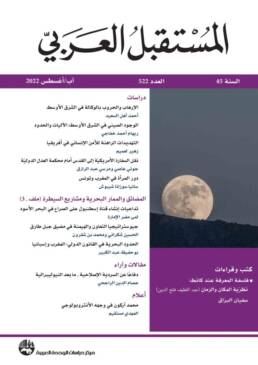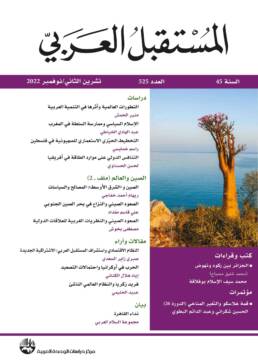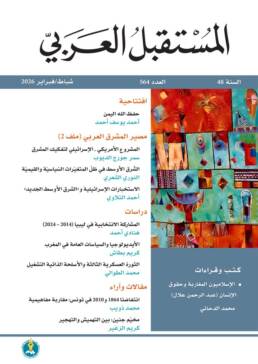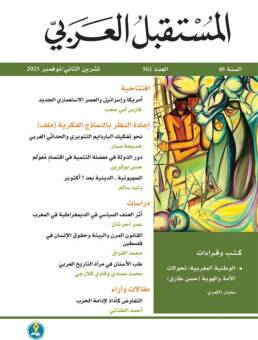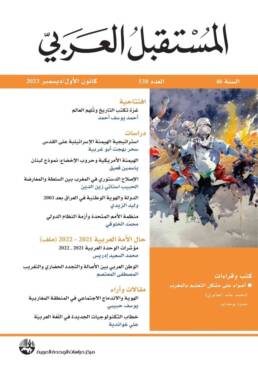⬛ Editorial
⬜ The Prospects of the Palestinian cause after the cessation of the
genocidal war Hassan Nafaa 7
⬛ Studies
⬜ The Impact of Recent International Fluctuations on Arab Energy and
Food Security Noureddine El-Daoudi 11
Recent international fluctuations, such as the COVID-19 pandemic, the Russia-Ukraine war, and the Israeli genocidal war on Gaza and the subsequent escalation in the region, which have even reached the maritime trade routes of the Red Sea, have had severe repercussions on the Arab world. These events also created pressures on Arab economies due to the instability in the energy and food sectors. This concerning situation is sounding an alarm, urging for urgent corrective actions to address these sectors, which have become critical following their significant impact on the Arab economy and its inability to withstand international fluctuations. These circumstances also revealed the fragility of the Arab economy in ensuring prosperity for its citizens.
Keywords: International fluctuations, COVID-19, Gaza War, Arab economy, energy security, food security
⬜ The Crisis of Contemporary Islamic
Political Thought Mustafa Dahmani 25
This study tackles the subject of contemporary Islamic political thought, based on the fundamental hypothesis that this thought was born in a state of crisis from the very beginning, dating back to the 1920s after the fall of the Ottoman Caliphate in 1924 and the rise of the nation-state. Over time, this thought has become increasingly strained, calling for the return of the caliphate. It later shifted towards a discourse that broke with Arab reformist ideologies and rejected liberal political philosophy, advocating instead for the restoration of Sharia-based politics and Islamic governance, epitomized by the slogan «Islam is both a religion and a state.» In later phases, Islamic political thought became further polarized with the concept of «Hakimiyya» (sovereignty of Allah), paving the way for the emergence of jihadist and takfiri organizations.
Keywords: Islamic political thought, caliphate, Hakimiyya, Hassan al-Banna, Sayyid Qutb.
⬜ Social and Cultural Norms and Their Impact on
Women’s Rights and Policies: The Egyptian
Model Salma Abdel-Sattar Abdel-Lah Abdel-Rahman 39
Social norms and cultural heritage represent some of the biggest barriers towards implementing policies that empower women at various levels. Among these norms are gender-based discriminatory standards and the traditionally negative view of women, which severely limit their rights and choices. These norms also prevent societies from benefiting from the numerous advantages of women’s participation and contribute significantly to creating an environment that fosters violence against women, even in the presence of laws that prohibit and criminalize such acts. Changing this entrenched situation requires continuous efforts from both the state and society to address these norms effectively, as demonstrated in recent decades through various policies, laws, and social, economic, political, and legislative measures.
Keywords: Gender, gender norms, discrimination against women, women empowerment, political participation, violence against women.
⬜ Child Labor and its Relationship with the Economic Reality and
Poverty: The Case of Kasserine Ahmed Belali 58
Child labor is one of the negative social phenomena that persist in many societies, albeit with varying degrees of prevalence and severity between different communities or countries, and across different fields of work such as agriculture, handicrafts, industry, and domestic labor. Child labor has become a central issue in Tunisia, as in many other societies, particularly with the worsening of child labor due to high unemployment rates and rising family expenses, forcing some families to send their children to work. Although Tunisian law prohibits this, poverty and the deteriorating economic situation often overpower legal protections.
Keywords: Child labor, economic situation, poverty, unemployment, cost of living, Tunisian labor law.
⬜ Southern Mediterranean Migrants and Political Demography
in Europe: Questions of Identity and Integration from a
Western Perspective Abdelhamid Al-Alaqi 76
This study explores the issue of migration to European countries, examining it from the European perspective itself, focusing on three main aspects: geography, demography, and politics. The study seeks to address two main questions: the first concerns the conclusions that can be drawn from the tools provided by political demography to understand the ongoing debate between the demographic situation of countries and their policies, and applying this framework to Europe as a space receiving migrants; the second question focuses on analyzing the positions of European political elites regarding identity and modernity in a global context shaped by demographic, political, and identity changes resulting from current intensified migration flows, and how all of this influences the contemporary European mindset in understanding perceived risks.
Keywords: Migration, identity, integration, Europe, Africa, political demography, modernity, European far-right.
⬜ Youth and Politics in the Post-«Moroccan Spring» Era: Paradoxes of Democratic Life in Morocco Rachid Jarmouni 95
This study aims to understand the relationship between youth and politics in Morocco after the «Arab Spring» period, particularly as these young people had significant aspirations and ambitions. The study starts with the hypothesis that youth in Morocco experience a tense relationship with political life in all its aspects—electoral, representational, as well as their withdrawal and political disengagement, to the point of stepping out of political and party structures. The research examines the views, attitudes, and positions of youth towards the Moroccan political system, political parties, and active associations, based on a sample that includes both party-affiliated youth and members of various associations, as well as politically unaffiliated youth. The goal is to understand the nature of Morocco’s political landscape, its complexities, interconnections, and tensions.
Keywords: Moroccan youth, democracy, political system, Moroccan political parties.
⬜ The Ibn Khaldun Trap and Great Power Competition with
China Carla Norrlof 114
(Translated by Ahmed Mohamed Abu Zaid)
The return of great power rivalry has been a defining feature of the 21st century. Since the dawn of the new millennium, both China and Russia have openly challenged the United States, which has destabilized the «liberal» international order. As a result, much ink has been spilled over the nature of the competition between the United States and China, and how far the two superpowers might go toward war. While there is a general consensus about China emerging as the primary rival to the U.S., disagreements remain regarding the nature of U.S.-China relations, as well as the causes and consequences of any competition between the two. This paper evaluates four well-known «traps» to better understand the competition between the U.S. and China, with a particular focus on Ibn Khaldun’s trap.
Keywords: Sino-Americanrivalry, international system, Superpower, wars.
⬛ Articles and Opinions
⬜ The Components of Chinese Mediation Diplomacy and
the Prospect of Breaking the Moroccan-Algerian
Crisis Line Mohammed Ali Zeryoul 136
⬛ Books and Reviews
⬜ The Empire of Numbers: The Sociology of Quantitative
Measurement (Olivier Martin, Translated by: Al-Zawawi Bghoura
and Jalla’ Smaain) Mabrouka Boutekhouka 145
⬜ More Books Gaby El-Khoury 151
Arabic Books: Age of Coexistence: The Ecumenical Frame and the Making of the Modern Arab World; Statistics and Politics Between the strength of Evidence and the influence of Authority; The Israeli Intelligence, Military, and Political Failure on October 7: Studies and Analyses by Israeli Experts and Researchers; Centralization of Political Decision-Making in Morocco
Foreign Books: Vatican Spies: From the Second World War to Pope Francis; Comrades Beyond the Cold War: North Korea and the Liberation of Southern Africa; Should the World Fear China?; Syria: Civil War to Holy War?.
Research Reports: «Transition 2025: What Will Donald Trump Do About Iran?»; «Understanding the Israel-Hamas Truce».
Add a review
You must be logged in to post a review.


